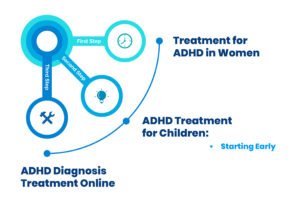Attention-deficit hyperactivity disorder (ADHD) is a nervous system disorder that affects a lot of individuals all over the world. Therefore, ADHD treatment is vital for a better life ahead. ADHD can be prevalent in children, and its management has remained a source of concern to many people in society because of its persistence into adulthood. Likewise, people with ADHD will be able to lead successful and fulfilling lives by having the right support.
In this blog, we will discuss the various treatment prescriptions that can be applied to treat ADHD, and we will specifically consider women, children, and adults. We will also repeat that it is necessary to engage in professional help, specifically, make sure that you get yourself an individual course of treatment, the help of an adult with ADHD psychiatrist.
Understanding ADHD and the Need for Treatment
The symptoms that come with ADHD, such as impulsivity, hyperactivity, and inattention, can significantly influence normal functioning. The etiology of ADHD remains unknown, but it has been established that it can be due to environmental factors, brain structure, and genetic factors.
Unless treated, ADHD may lead to academic issues, workplace underperformance, unhealthy relationships, and many other issues. So, how to cope with the symptoms and improve the quality of life, it is of paramount importance to discover an effective treatment for ADHD. Luckily, some treatment procedures are available, which include behavioral therapies, internet treatment, and medications.
ADHD Treatment for Adults: A Unique Approach
Although ADHD is generally considered a condition of children, the disorder also affects several adults. The process of ADHD treatment for adults should not follow the same approach as that of treating children because adults generally have more obligations: career, family, and social life, among others. In this case, an Adult ADHD psychiatrist can be of great help, because they are specialized in diagnosing and treating ADHD in adults.
Medication for ADHD Treatment
Healthcare providers typically prescribe medication therapy for ADHD to facilitate the control of its symptoms. The ADHD medication can be divided into two broad groups:
- Stimulants are the most prevalent type of medication used in the treatment of ADHD, and they comprise medications similar to those of methylphenidate (Ritalin) and amphetamines (Adderall). These medications work by raising the amount of dopamine in the brain, or, in other words, by settling the brain and making it less impulsive.
- Non-stimulants are not all-free and may actually possess possible side-by-products that are neither pleasant nor acceptable. The non-stimulant pharmaceuticals, like player atomoxetine (Strattera), are alternatives to the stimulant drugs. These drugs influence other parts of the brain and are not as abusive.
The Adult ADHD psychiatrist can identify the most appropriate medication depending on the needs of a person and their health history.
Behavioral Therapy
Along with medications, another method of ADHD treatment for adults is therapy. The purpose of behavioral therapy is to help people work out the mechanisms to cope with their symptoms, develop better organizational capacity, and address the problems in their personal and professional lives. Cognitive-behavioral therapy (CBT) may prove effective in the treatment of ADHD in adults since it considers both the mental and the emotional components of the disorder.
Lifestyle Modifications
Adults can achieve treatment of ADHD through changes in routine activities. This includes:
- A regular schedule: Routines allow an ADHD person to be orderly and motivated.
- Intense exercise increases the amount of dopamine and serotonin in the brain, therefore boosting mood and attention level.
- Mindfulness and relaxation type: This can be done through the process of mindfulness, which can help reduce stress and enhance concentration, which is paramount in controlling symptoms of ADHD.
ADHD Treatment for Women: Addressing Unique Needs

1.Treatment for ADHD in Women
Women with ADHD can also have particular hardships, like balancing career, family, and social life, a situation that can contribute to serious symptoms. The process of treatment is subject to medication, treatment, and lifestyle changes in the case of ADHD in women. Some women can experience other issues, such as hormonal changes, which can also influence ADHD symptoms. Hence, a treatment specific to their needs is worth having.
A neurotransmitter may change as hormones increase or decrease in the brain, and that is why it is important to cooperate with a medical professional, knowing the intersection of ADHD and hormonal changes. An Adult ADHD psychiatrist with experience in treating women reduces these difficulties.
2.ADHD Treatment for Children: Starting Early
Early management and diagnosis of ADHD play an important role in the right direction of children. The ADHD treatment for children is usually through behavior therapy, intervention of education, and, in some cases, through medication. The teachers and parents work together so as to come up with a measure that will help the boy or girl to perform highly at school and in terms of social life.
3.ADHD Diagnosis and Treatment Online
As ADHD treatment is becoming more and more available ADHD treatment online, parents can find convenient and effective ways of treating their children without having to go out of their homes. Virtual consultations with online therapists and psychiatrists for ADHD are also available, which simplifies access to professional treatment for ADHD in children and parents.
Online ADHD Treatment: A Convenient Option
Online ADHD treatment has become more and more popular as the world shifts to digital solutions. For people who might not have access to in-person services because of time or location restrictions, this method provides flexibility. In the modern era, the greatest online ADHD treatment options are accessible.
Many online platforms provide virtual consultations with licensed ADHD psychiatrists and therapists. Services like online psychiatrist ADHD consultations and virtual medication management have made it easier to access quality care remotely.
Some platforms even offer ADHD treatment guidelines to help individuals understand their treatment plan and what to expect throughout the process. These platforms also ensure that individuals receive comprehensive care, addressing medication, behavioral therapy, and lifestyle adjustments.
Natural ADHD Treatment: Exploring Alternatives
Some of them are unwilling to take medications, and natural treatment of ADHD can give certain relief. This does not replace professional treatment, but some natural treatments to mainstream it, consist of:
- There is a bit of evidence that can be used to treat ADHD symptoms using supplements such as zinc, magnesium, and iron.
- Some herbs, such as ginseng or valerian root, may calm and may make other individuals less hyperactive and less anxious.
- Seek assistance from a medical professional about natural therapies since they do not interact with other medicines or therapies.
Treatment for ADHD in Adults: Moving Towards Long-Term Solutions
In the case of adult patients with ADHD who have been living with the condition for many years, identifying treatment for ADHD in adults is essential to control their symptoms and enhance their quality of life. Treatment of ADHD in adults typically implies a combination of drugs, therapy, and self-management. The idea is to make them stay organized, focused, and minimize impulsive behavior that may influence their daily activities and relationships.
The Adult ADHD psychiatrist also has a significant role in directing therapy by providing unique guidance on how to handle the difficulties brought about by ADHD. Since the symptoms of ADHD may vary with time, engaging a psychiatrist enables the necessary changes to be made to the treatment plan to accommodate the changing needs of the individual. This medical support, combined with coping strategies, results in more understanding and control of ADHD, resulting in a more rewarding life.
Final Remarks
Treatment of ADHD is important to control the symptoms of the disorder in adults as well as children and women. Medications, therapy, and online ADHD treatment for adults are some of the options that people can consider to help them live better lives. Professional assistance, especially that of an Adult ADHD psychiatrist, should be sought, and personalized care and counseling should be offered.
Whether you turn to traditional treatment or the natural treatments of ADHD, the objective is to determine a solution that will best suit you and help you to achieve long-term success. To get good and credible information regarding mental health and expert advice about the problem, it is advisable to approach Mental Behavioral. It is a reliable site that helps to find valuable details and materials that will help those who have ADHD cope with the disease.
FAQs
Which is the most effective adult treatment for ADHD?
A combination of medication, therapy, and lifestyle changes is usually the best treatment for ADHD in adults. Some of the drugs that are used are stimulants and non-stimulants, and cognitive behavioral therapy (CBT).
Can ADHD be treated online?
Yes, online ADHD therapy is a good choice for many individuals. The online platforms provide an opportunity to contact licensed psychiatrists to consult about ADHD, online therapy, and managing medications.
What are the differences in ADHD treatment for women?
The treatment of ADHD in women can require consideration of the hormonal variations that can potentially influence symptoms (during pregnancy or menopause). Women can also require specialized treatment to balance work and life, among other special problems.
How does medication play a role in ADHD treatment?
The medication used in ADHD treatment is usually a major aspect of ADHD management. There are stimulants (such as Adderall) and non-stimulants (such as Strattera) used to deal with hyperactivity in the brain and enhance concentration and impulsivity.
How do I know if I have ADHD?
The best method of establishing whether you have ADHD is by an ADHD test for teens or an assessment with an Adult ADHD psychiatrist. These assessments involve questionnaires, interviews, and in some cases, neuropsychological assessments.








